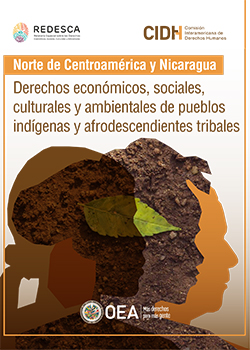
Press Release
IACHR Presents Report on Economic, Social, Cultural, and Environmental Rights of Indigenous Peoples and People of African Descent in Central American Countries
April 25, 2023
Contact info
IACHR Press Office
Distribution List
Washington, D.C.—The Inter-American Commission on Human Rights (IACHR) has launched a new thematic report: The Economic, Social, Cultural, and Environmental Rights of Indigenous Peoples and Tribal People of African Descent in El Salvador, Guatemala, Honduras, and Nicaragua. The main objective of the publication is to analyze the current status of the rights of indigenous peoples and people of African descent to collective property, a healthy environment, food and water, healthcare, and education in El Salvador, Guatemala, Honduras, and Nicaragua, in light of inter-American standards.
The three chapters of the report contain a list of inter-American standards on the economic, social, cultural, and environmental rights of indigenous peoples and tribal peoples of African descent. It then provides a diagnostic review of the historical inequalities these groups have experienced and the current situation. The report also covers the rights of these peoples that have been recognized in the countries covered by the report, as well as the limited public policies in place to enable them to access their rights. It also makes recommendations to the States in question regarding the challenges that impede these peoples’ full enjoyment of their rights.
The historical discrimination that indigenous people and people of African descent have endured initially entailed the denial of their being human beings and subjects of rights. Subsequently, when the States in question were being established, these groups were excluded from the processes of defining and establishing laws and policies relating to their individual and collective rights as ethnic peoples. In recent years, they have been victims of armed conflicts in the region and are currently facing the consequences of extractive activities that are being carried out in their territories.
Over time, these processes have resulted in their losing possession of their ancestral territories; a lack of participation, consultation, and representation in democratic institutions; and the absence of an intercultural perspective within State institutions that considers the worldviews of indigenous peoples and tribal people of African descent.
Against this backdrop, the report addresses the situation of the ancestral territories of indigenous peoples and tribal peoples of African descent in El Salvador, Guatemala, Honduras, and Nicaragua. The organs of the Inter-American Human Rights System have highlighted the special connection that exists between indigenous and tribal peoples and their territories and natural resources. These peoples’ very existence is conditional on this connection, through which diverse practices and traditions that are part of these groups’ worldviews are forged and reproduced. Special protective measures need to be put in place as a consequence of this link. It should also be taken into account when analyzing other rights, such as economic, social, cultural, and environmental rights.
The IACHR hopes that the findings of this report and the recommendations it sets out will help raise awareness and increase appreciation of the ways of life of indigenous peoples and tribal people of African descent. It also hopes that the report will promote initiatives to overcome obstacles to the full enjoyment of their economic, social, cultural, and environmental rights and their other human rights. The IACHR also placed its technical cooperation mechanisms at the disposal of States and civil society in order to contribute to tackling these challenges.
Finally, the IACHR is grateful for the support of the Swiss Agency for Development and Cooperation (COSUDE) in the preparation of this report, which is part of a project to strengthen governance and the protection of human rights in the countries of Northern Central America, with an emphasis on vulnerable populations. Similarly, in view of the difficulties associated with the scarcity of data, statistics, and general information on this population’s circumstances, the IACHR is especially grateful for the responses it received to requests for information from States and civil society. It also wishes to thank the people who were interviewed during the drafting of this report and those who took part in the meetings that were organized for this purpose.
A principal, autonomous body of the Organization of American States (OAS), the IACHR derives its mandate from the OAS Charter and the American Convention on Human Rights. The Inter-American Commission has a mandate to promote respect for and to defend human rights in the region and acts as a consultative body to the OAS in this area. The Commission is composed of seven independent members who are elected in an individual capacity by the OAS General Assembly and who do not represent their countries of origin or residence.
No. 075/23
10:45 AM


